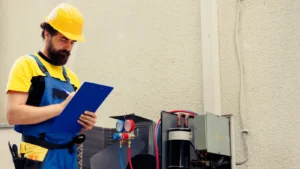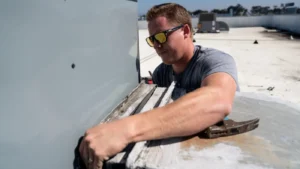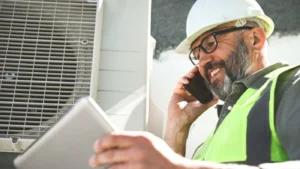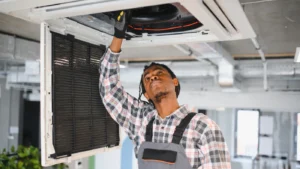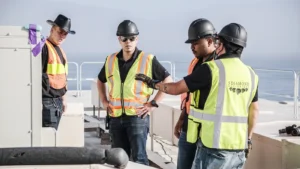
Want to see your potential revenue?
See what businesses like yours earn with Housecall Pro in 1 - 2 minutes.

If you’re working in the HVAC field or hoping to land your next job, your resume matters. It tells employers what you know how to do, and how ready you are to get started. Whether you’re just getting started or have years of experience under your belt, listing the right skills can help you stand out.
From working with refrigerants to understanding smart thermostats, there’s a lot that today’s HVAC pros need to know. In this article, we’ll list 15 HVAC skills worth adding to your resume. These are skills that hiring managers often look for, and ones that Housecall Pro’s field service management software helps technicians put into practice every day through better scheduling, customer communication, and field support. Let’s get started.
- What Are HVAC Hard Skills?
- 15 of the Most Important HVAC Skills
- 1. Refrigerant Handling and Recovery
- 2. Electrical Diagnostics and Repair
- 3. Thermostat Installation and Programming
- 4. Air Conditioning Installation
- 5. Heating System Repair and Maintenance
- 6. Ductwork Fabrication and Installation
- 7. Soldering and Brazing
- 8. Reading Blueprints and Technical Diagrams
- 9. Ventilation and Airflow Balancing
- 10. Using HVAC Diagnostic Tools
- 11. Performing Load Calculations
- 12. Installing and Servicing Heat Pumps
- 13. Working with Smart HVAC Systems
- 14. Gas Furnace Troubleshooting
- 15. Understanding Building Codes and Safety Standards
- Putting Your HVAC Skills to Use in the Field
- Frequently Asked Questions
What Are HVAC Hard Skills?
Before we get into our list of hard skills, let’s explain what we mean by hard skills and how they are different from soft skills.
Hard skills are the hands-on, technical abilities you learn through training, school, or on-the-job experience. These include things like using HVAC tools, reading blueprints, installing systems, and handling refrigerants. Hard skills can be tested, measured, and often require certification or licensing.
They’re different from soft skills, which are more about how you work with others, like communication, teamwork, or time management. While both types of skills matter in the HVAC field, hard skills show that you can actually do the job.
HVAC Soft Skills to Add to Your Repertoire
Though we’re here to talk about HVAC hard skills, we’d be remiss if we didn’t spend just a bit of time on the soft skills that can help make you one of the best HVAC technicians in your field. While technical ability gets you in the door, how you treat your customers often decides whether they invite you back.
According to Zendesk Benchmark data, 73% of consumers will switch to a competitor after multiple bad experiences. Even more surprising, 56% rarely complain. They just quietly go elsewhere. That means the way you speak, act, and carry yourself on the job matters just as much as your wrench skills.
Soft skills worth adding to your repertoire include:
- Communication: Clearly explain problems and solutions to customers and coworkers.
- Patience: Handle delays, tough jobs, or frustrated clients without losing your cool.
- Time Management: Show up on time and finish jobs when expected.
- Problem-Solving: Think on your feet when the issue isn’t what you expected.
- Adaptability: Be ready to work in new environments with different systems.
- Teamwork: Cooperate with others on big installs or complex repairs.
- Professionalism: Stay polite, respectful, and reliable—every time.
15 of the Most Important HVAC Skills
Now, let’s get to that list of 15 specific HVAC hard skills that are worth listing on your resume.
1. Refrigerant Handling and Recovery
Handling refrigerants safely and legally is one of the most important parts of being an HVAC tech. You need to know how to recover, recycle, and charge refrigerants without causing damage to the system or the environment. This includes following EPA guidelines and using the right tools for the job.
Only Section 608 certified technicians are allowed to purchase or handle refrigerants used in stationary air conditioning and refrigeration equipment. Many jobs require this certification, so listing it on your resume can help you stand out. If you’re preparing for HVAC tech interview questions, this is one skill employers are almost always going to ask about.
2. Electrical Diagnostics and Repair
HVAC systems rely on complex wiring and electrical components. Knowing how to read wiring diagrams, use multimeters, and find faults in the system is part of the job. A technician should be able to repair or replace faulty capacitors, relays, motors, and fuses without guessing. Solid electrical skills help prevent bigger problems down the line and are a must for technicians in both residential and commercial work.
3. Thermostat Installation and Programming
Modern HVAC systems often include programmable or smart thermostats. Installing these devices and making sure they connect to the HVAC unit properly takes skill and care. You’ll also need to explain to customers how to use them. Understanding how to troubleshoot thermostat issues, like incorrect readings or connectivity problems, is part of HVAC basic knowledge that every tech should have.
4. Air Conditioning Installation
Installing air conditioning units isn’t just about putting in a box and flipping a switch. It includes planning the right location, connecting refrigerant lines, making electrical connections, and checking for proper airflow. You’ll also need to test the system before calling the job done. If you’re applying for jobs, this is one of the core skills for your HVAC resume.
5. Heating System Repair and Maintenance
Furnaces and heating systems come in many types, from electric to gas. Understanding how each works and knowing how to diagnose and repair common problems is important. This can include cleaning burners, replacing filters, checking flame sensors, and making sure gas connections are safe. Heating repair is in high demand during colder months, so this skill often helps techs stay busy year-round.
6. Ductwork Fabrication and Installation
Proper ductwork helps systems run the way they’re supposed to. Being able to measure, cut, and seal ducts, whether they’re metal or flexible, is a big part of many HVAC jobs. Leaky or poorly fitted ducts can waste energy and make systems work harder. Learning how to install ductwork correctly also improves airflow and helps prevent comfort issues in different rooms.
7. Soldering and Brazing
Joining copper pipes for refrigerant lines requires either soldering or brazing. These two processes use heat and filler metals to connect pipes so they don’t leak under pressure. Good technique takes practice. You’ll need the right tools, safety gear, and a steady hand. HVAC systems depend on solid connections, so being skilled in this area makes you more useful on the job.
8. Reading Blueprints and Technical Diagrams
HVAC technicians often work off blueprints and diagrams. These documents show how the system is laid out in a building, including duct runs, wiring paths, and equipment locations. Understanding these layouts helps you plan your work and avoid mistakes. It’s also a big help when trying to spot problems that others might miss.
9. Ventilation and Airflow Balancing
Good airflow keeps HVAC systems working the way they’re supposed to. Technicians need to be able to measure airflow, check for obstructions, and adjust dampers or fans. Balancing systems help improve comfort in every room of a house or building. It’s also one of the qualities for an HVAC technician that leads to better service and fewer callbacks.
10. Using HVAC Diagnostic Tools
From pressure gauges and multimeters to combustion analyzers and thermal cameras, HVAC techs rely on tools to figure out what’s going wrong. Knowing what tool to use, when to use it, and how to read the results takes training and hands-on time in the field. This skill also makes repairs faster and helps avoid guessing.
11. Performing Load Calculations
Before installing a new HVAC system, technicians need to know how much heating or cooling the space actually needs. HVAC load calculations take into account square footage, insulation, window types, and other factors. The right calculations (or HVAC load calculator) help you pick the right equipment for the job and avoid short cycling or oversized units.
Get In Touch: 858-842-5746
Let us earn your trust
On average, Pros increase monthly revenue generated through Housecall Pro by more than 35% after their first year.
See plan options and feature breakdown on our pricing page.
12. Installing and Servicing Heat Pumps
Heat pumps are becoming more common in homes across the country. They can provide both heating and cooling, which makes them an attractive option. But installing and maintaining them takes a good understanding of how they work. This includes defrost cycles, reversing valves, and refrigerant levels. Knowing how to work with heat pumps gives you more opportunities in the field.
13. Working with Smart HVAC Systems
Smart systems are on the rise, especially in newer homes and commercial buildings. These systems include sensors, apps, and controls that help customers track energy use and adjust settings from their phone. As a technician, you’ll need to know how to install and connect these devices, troubleshoot tech issues, and walk users through the setup process.
14. Gas Furnace Troubleshooting
Gas furnaces require special care. You’ll need to check burners, pilot lights, gas valves, and heat exchangers. It’s also important to check for safety issues, like carbon monoxide leaks. When a gas furnace isn’t heating correctly, you may need to look at everything from the thermostat to the flame sensor to find the root of the problem.
15. Understanding Building Codes and Safety Standards
HVAC work often falls under local and state building codes. Following these rules isn’t just about avoiding fines; it also keeps people safe. Codes can cover everything from how ducts are sealed to how close a furnace can be to a wall. A good technician knows how to apply these rules on every job site.
Putting Your HVAC Skills to Use in the Field
Knowing how to do the job is only half the equation. The other half is putting your HVAC skills to work in a way that’s smart, organized, and professional. Whether you’re new to the HVAC industry or have years of experience, the skills listed above help show what you can do—and why you’re a good fit for the job. From reading blueprints to handling refrigerants, these are the abilities that employers and customers expect you to bring to every appointment.
But strong skills need the right support. That’s where Housecall Pro comes in. With field service management features for scheduling, dispatching, invoicing, and customer communication, Housecall Pro helps HVAC pros stay on top of their work. You don’t have to juggle paperwork or lose track of important tasks. Everything is right there when you need it.
If you’re ready to take your skills beyond the resume and apply them in a way that works better for you and your customers, give Housecall Pro a try. Sign up today for a free 14-day trial and see how easy it can be to manage your day, your jobs, and your entire business from one place.
Frequently Asked Questions
We know you have questions. And we’ve got the answers. Let’s take a moment to answer some of the questions you might have about top HVAC skills for your resume.
Is HVAC a Hard Skill?
Yes, HVAC is considered a hard skill because it involves hands-on technical work. These are skills you learn through formal training, apprenticeships, or experience on the job. Examples include installing air conditioning systems, performing load calculations, and using diagnostic tools.
Since HVAC systems are mechanical, electrical, and sometimes digital, technicians must understand how to work with each part. These abilities are usually listed under the “skills” section of an HVAC job description because they can be taught, tested, and measured. Unlike soft skills like communication, hard skills show that you can physically perform the tasks required.
What Skills Do You Need for HVAC?
To succeed in the HVAC field, you’ll need both technical knowledge and practical experience. Some important hard skills include handling refrigerants, reading blueprints, working with electrical components, and balancing airflow. You’ll also need soft skills such as problem-solving, time management, and the ability to speak clearly with customers.
Many employers who are hiring an HVAC technician look for a mix of both. Being able to explain issues to a homeowner while also fixing the problem shows that you can handle the full scope of the job. It’s this balance that makes someone a valuable team member.
What Are The Strengths of an HVAC Technician?
A good HVAC technician has a mix of technical skill, patience, and strong attention to detail. Strengths might include being able to diagnose problems quickly, work independently, and follow safety rules carefully. Mechanical know-how is important, but so is having a calm approach when something unexpected happens.
Flexibility is another strength, as no two jobs are exactly the same. These qualities help you stand out in a crowded field. When looking at an HVAC job description, you’ll often notice both hard and soft strengths listed together, because doing the job well takes more than just one type of ability.
What Are The Areas of Expertise for HVAC?
HVAC covers a wide range of specialties. Some techs focus on installation, while others are experts in system repair or maintenance. You might work mainly with furnaces, air conditioning units, heat pumps, or smart thermostats. Other areas of expertise include ductwork, energy efficiency audits, and zoning systems.
Over time, many technicians develop deep knowledge in one or two areas while keeping a general understanding of the rest. When applying for a job, it’s helpful to highlight your specific expertise on your resume and be ready to talk about them in an interview. That can set you apart from other candidates.
How Can You Improve Your HVAC Skills?
There are many ways to improve your HVAC skills, no matter your experience level. You can take continuing education classes, earn new certifications, or ask to shadow more experienced coworkers on different types of jobs. Reading manuals, watching how-to videos, or attending training sessions also helps.
Another smart move is learning how to use HVAC business software, which helps with scheduling, invoicing, and service records. This shows that you’re ready for more responsibility and want to grow in the field. If you’re serious about your future, improving your skills will make you more attractive to companies hiring an HVAC technician.


